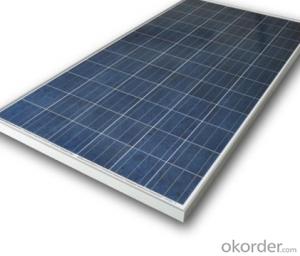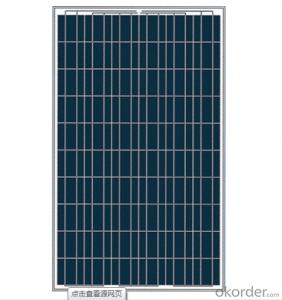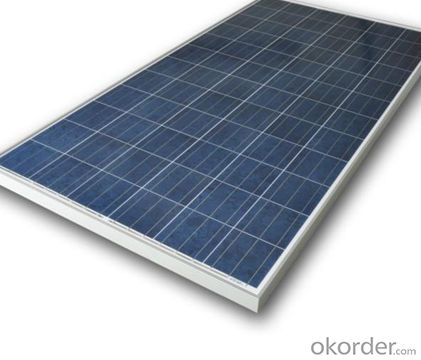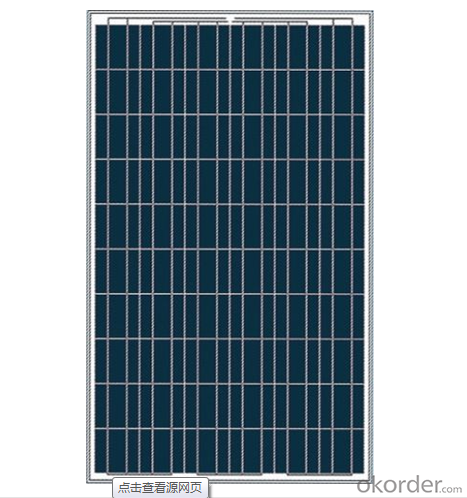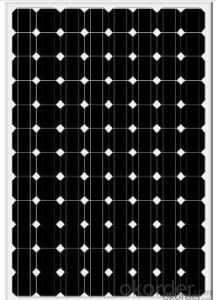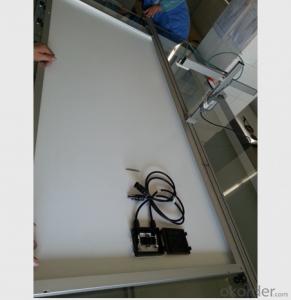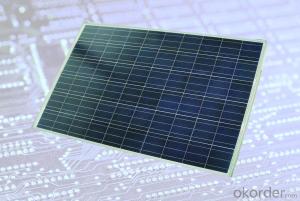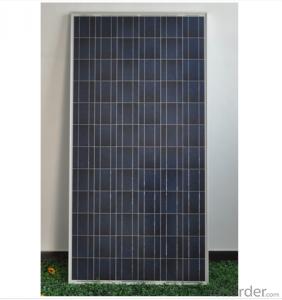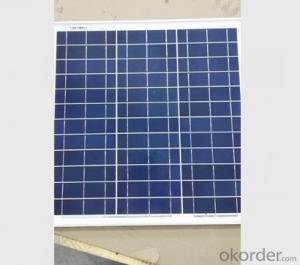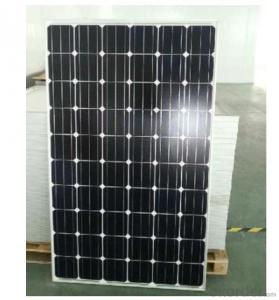Solar Panels Murrieta - Polycrystalline Solar Panel CNPV-260W High Performance 60 Cell
- Loading Port:
- Qingdao
- Payment Terms:
- TT OR LC
- Min Order Qty:
- 25 pc
- Supply Capability:
- 100000 pc/month
OKorder Service Pledge
OKorder Financial Service
You Might Also Like
Product Description:
Solar Polycrystalline Series Panels
Introduction of Solar Polycrystalline Series Panels
CNBM Solar photovoltaic (PV) Panel is designed for large electrical power requirements. It is the optimal choice for both on-grid and off-grid power systems. CNBM Solar panel offers high performance of power per square foot of solar array. Monocrystalline silicon(c-Si): often made using the Czochralski process. Single-crystal wafer cells tend to be expensive, and because they are cut from cylindrical ingots, do not completely cover a square solar cell module without a substantial waste of refined silicon. Hence most c-Si panels have uncovered gaps at the four corners of the cells.
Standard Test Conditions of Solar Polycrystalline Series Panels
The opto-electrical specifications shown below are stabilized values being measured at Standard Test Conditions, Irradiance: 1000W/m2, Spectrum: AM1.5 at 25°C, The info below is subject to manufacturing tolerances. Where appropriate minutes of measurement are available and are used for the dimensioning of the installation.
Advantages of Solar Polycrystalline Series Panels
• Solar performance guarantees for 25 years
• 12 years guarantee for workmanship
• Timeliness of delivery
Characteristics of Solar Polycrystalline Series Panels
Max Power Voltage Vmp (V) | 31.05V |
Max Power Current Imp (A) | 8.4A |
Open Circuit Voltage Voc (V) | 38.2V |
Short Circuit Current Isc (A) | 8.94A |
Max Power Pm (W) | 260W |
Temperature Coefficient of Cells
NOCT | 47℃±2℃ |
Temperature Coefficients of Isc (%/℃) | 0.064 |
Temperature Coefficients of Voc (%/℃) | -0.33 |
Temperature Coefficients of Pmp (%/℃) | -0.45 |
Mechanical Data Solar Polyocrystalline Series
Power | 260W |
Dimension | 1650×992×35mm |
Weight | 18kg |
Tolerance | ±3% |
The dimension of the modules can be changed according to the demand of clients
Limits
Operating Temperature | –40 °C to +85°C |
Storage Temperature | –40 °C to +85°C |
Max System Voltage | 700V |
Guarantee Solar Polyocrystalline Series Panels
Products Guarantee | 12 yrs free from defects in materials and workmanship |
Performance Guarantee | No less than 90% within 10yrs and no less than 80% within 25yrs |
Certificates | UL, IEC, ISO, TUV, CE |
The Examination of Solar Polyocrystalline Series Panels
FAQ
We have organized several common questions for our clients,may help you sincerely:
1. What’s price per watt?
A: It’s depends on the quantity, delivery date and payment terms of the order. We can talk further about the detail price issue. Our products is high quality with lower price level.
2. Can you tell me the parameter of your solar panels?
We have different series of cells with different power output, both from c-si to a-si. Please take our specification sheet for your reference.
3. How do you pack your products?
We have rich experience on how to pack the panels to make sure the safety on shipment when it arrives at the destination.
Normally we put the panels in carton and then in pallets.
4. Can you do OEM for us?
Yes, we can. It will depend on the quantity.
- Q: When you get solar panels do you connect them to the grid?
- Not directly and it also depend on where you live. If where you live has net metering then they would be indirectly connected to the grid, there is equipment involved besides just the panels on the roof.
- Q: Does a solar panel work under a full moon a tiny bit, or not at all? Likewise, if you used mirrors or lenses the concentrate sunlight, is there a maximum to how much a solar panel can handle?
- solar panels should be used where the sunlight is abundant,you can use mirrors or lenses the concentrate sunlight,solar panels will absorb more light.
- Q: When you add a load resistor to a PV panel (Solar panel) of 00 ohms what happens to the voltage produced from the cellAlso, as the resistance increases, how does this affect the output voltage
- Photovoltaic cells have a load curve that gives the power conversion based on the current drawn. This makes it harder to calculate. For instance, at infinite resistance, the solar cell will have a peak voltage that produces no power (P=I*V=V^2/r). At short circuit, the voltage collapses to essentially nothing and so the power is almost nothing. There is an optimal load (sweet spot) where the resistance applied will draw the most power out of the cell while not overloading it. This measure is either given by the manufacturer or found experimentally. Upon taking a lit panel that has no load and applying a 00 ohm resistance, the voltage will drop. By how much is entirely dependent on the array layout and specific cell characteristics. As the resistance drops from the optimal load point, the voltage collapses fairly sharply. As the resistance increases from the optimal load point, the voltage will rise more at first and then level off to the peak or no-load voltage.
- Q: Any feedback on solar panels?
- Solar panels really works good and reduce the usage of electricity.
- Q: Can solar panels be used for powering a farm or agricultural operation?
- Yes, solar panels can be used to power a farm or agricultural operation. Solar energy can be harnessed through photovoltaic (PV) panels and converted into electricity to meet the energy demands of various agricultural activities such as irrigation, lighting, and running machinery. Solar power offers a sustainable and renewable energy source, reducing reliance on fossil fuels and minimizing operational costs for farmers. Additionally, solar panels can be installed on unused land, rooftops, or even integrated into greenhouses, making them highly adaptable for agricultural settings.
- Q: How much energy can solar panels produce?
- The amount of energy solar panels can produce depends on various factors such as the size and efficiency of the panels, the location and climate, and the amount of sunlight available. On average, a typical residential solar panel system can generate anywhere from 4,000 to 8,000 kilowatt-hours (kWh) of electricity per year. However, larger commercial or utility-scale solar installations can produce significantly more energy, potentially reaching several megawatts of power.
- Q: Can solar panels be installed on a carport or parking lot?
- Yes, solar panels can be installed on a carport or parking lot. This is known as solar carport or solar parking lot systems. They provide shade for parked vehicles while generating clean and renewable energy.
- Q: Can solar panels be used for heating swimming pools?
- Yes, solar panels can be used for heating swimming pools. Solar thermal panels, also known as solar collectors, are specifically designed to capture and convert sunlight into heat energy, which can be used to warm the water in swimming pools. This method of heating pools is environmentally friendly and cost-effective in the long run, as it relies on free and abundant solar energy.
- Q: Can solar panels be damaged by hail?
- Yes, solar panels can be damaged by hail. Hailstones, especially larger ones, can cause cracks or dents in the glass surface of solar panels, which may impair their efficiency and performance. It is important to note that the severity of the damage will depend on the size and speed of the hailstones, as well as the quality and durability of the solar panel materials.
- Q: name things someone could use solar panels for or make with solar panels? (use solar energy i mean?)
- Solar panels can bee installed into your houses or apartments power box (if it's outside). But Solar panels cost more than $00 so i hope you saved up.
Send your message to us
Solar Panels Murrieta - Polycrystalline Solar Panel CNPV-260W High Performance 60 Cell
- Loading Port:
- Qingdao
- Payment Terms:
- TT OR LC
- Min Order Qty:
- 25 pc
- Supply Capability:
- 100000 pc/month
OKorder Service Pledge
OKorder Financial Service
Similar products
Hot products
Hot Searches
Related keywords
